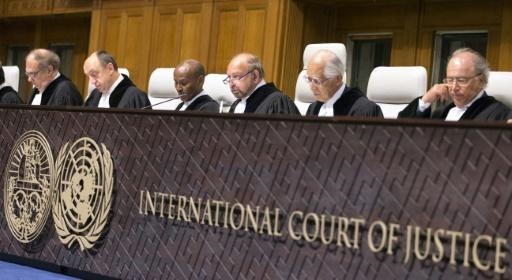 World
World

The UN's top court was to rule Thursday on an urgent bid by India to stop Pakistan from carrying out a death sentence imposed on an Indian national convicted of spying.
 |
| UN court to rule on Indian ’spy’ facing execution.—AFP Photo |
THE HAGUE — The UN’s top court was to rule today on an urgent bid by India to stop Pakistan from carrying out a death sentence imposed on an Indian national convicted of spying.
In an emergency hearing on Monday held only days after India lodged its case, lawyers for New Delhi called on the International Court of Justice to order Islamabad to suspend its execution of Kulbhushan Sudhir Jadhav.
Jadhav was arrested in the southwestern province of Balochistan in March 2016 and Pakistani officials claim he has confessed to spying for Indian intelligence services. He was convicted last month by a court martial and sentenced to death.
The UN tribunal, based in The Hague, said in a statement issued Wednesday that it "will deliver its order on the request for the indication of provisional measures made by India in the Jadhav Case (India v. Pakistan), tomorrow on Thursday 18 May 2017".
The president of the court, Ronny Abraham, will read out the decision at midday (1000 GMT).
The case -- a rare foray for the two nations into the international courts -- has highlighted the recent sharp upsurge in tensions between the nuclear-armed rivals.
India has denied Jadhav was a spy, and on Monday accused Pakistan of "egregious violations of the Vienna convention" by denying him access to legal counsel and consular visits, and refusing to reveal the charge sheet against him.
It wants the ICJ to decide whether Pakistan has broken the convention and international human rights law.
But in the meantime as the court considers whether to take up India’s case, New Delhi asked the tribunal to order a stay of execution until the end of the legal battle.
Jadhav was "an innocent Indian national, who, incarcerated in Pakistan for more than a year on concocted charges ... has been held incommunicado... and faces imminent execution," Indian lawyer Deepak Mittal told the tribunal Monday.
But Pakistani representatives accused New Delhi of "political grandstanding" and told the court Jadhav "has confessed to having been sent by India to wage terror on the innocent civilians and infrastructure of Pakistan".
Lawyer Khawar Qureshi denied the execution was imminent, though he did not give a timeframe.
The ICJ was set up in 1945 to rule on disputes between nations in accordance with international law.
The last time India and Pakistan took a dispute to the ICJ was in 1999 when Islamabad protested against the downing of a Pakistani navy plane that killed 16 people.
In that case, the tribunal decided it was not competent to rule in the dispute and closed the case.
India and Pakistan routinely accuse one another of sending spies into their countries, and it is not uncommon for either nation to expel diplomats accused of espionage, particularly at times of high tension. But death sentences have rarely been issued in recent years. — AFP